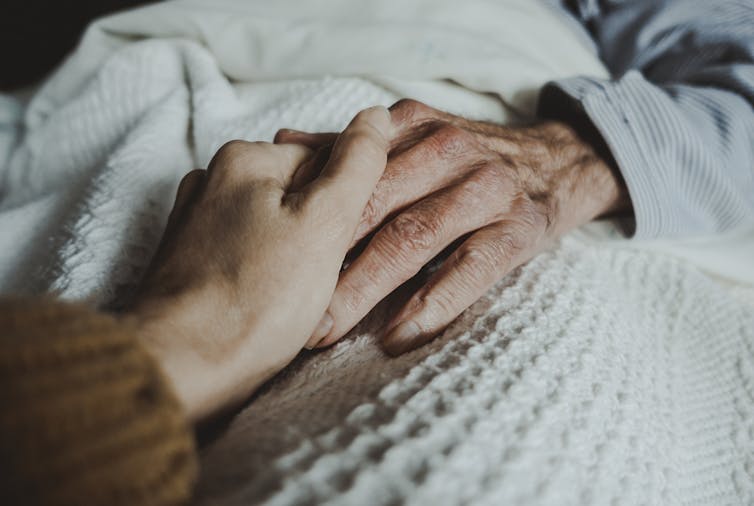Table of Contents
Maria Kulp
Associate Professor of Philosophy, Gonzaga University

Imagine that you have lived with an illness for years. The suffering this illness has caused is devastating – so much that you wish to die. You no longer feel like the person you were before. You have been to see specialists, have tried the best treatments, but nothing works.
This is many people’s reality, and not only because of physical disorders and disease. Chronic mental illness can be just as crushing. Starting in March 2024, Canada planned to make medical assistance in death, or MAID, available to people with mental illness – expanding a program already available to patients with terminal or chronic physical illness. In 2022, more than 13,000 people in Canada died with medical assistance, according to a government report.
In February, however, the government announced a three-year delay for the controversial program, saying the health care system needs more time to prepare.
When it is enacted in March 2027, this new provision will make Canada one of the few countries that allow MAID for mental illness. These include the Netherlands and Switzerland. Only a minority of U.S. states, such as Maine and Oregon, allow any kind of MAID, though many others have debated it – and none allow it for mental illness.
Critics say there are inadequate safeguards and a dearth of health care coverage for psychiatric and psychological issues, which could prompt people to view MAID as their only alternative. They also point to the difficulty of predicting whether or not someone’s mental illness will eventually get better.
MAID activists believe that access to this choice for patients with mental illness is morally required. But even people not opposed to Canada’s new provision are concerned about whether the system is ready.
As a philosopher who specializes in end of life ethics and physician-assisted death, I research a distinction that is at the heart of this debate. There is a subtle but crucial difference between being acutely suicidal – an experience that may pass – and, after long consideration, desiring death in the face of suffering.
My body, my decision?
Plenty of people oppose MAID – often called physician-assisted death – under any circumstances, including terminal physical illness. Some believe it violates the sanctity of human life.
Others have qualms about asking doctors, who are normally concerned about the preservation of human life, to participate in ending it. In other words, they emphasize nonmaleficence, the obligation to do no harm – one of the core tenets of medical ethics.
Many proponents, on the other hand, base their arguments on two other core tenets: beneficence – the obligation to benefit the patient – and autonomy. Autonomy arguments usually assume that a government is only justified in restricting citizens’ liberty if exercising that liberty would cause harm to other people.
Advocates of physician-assisted death emphasize that ending one’s own life does not harm other people, suggesting that the government has no business curtailing the patient’s choices. Legalization ensures that citizens can make their own decisions about one of the most personal and value-laden times of life.
In medical ethicists’ view, in order for a person to be considered autonomous, they must be able to act intentionally and with an understanding of the potential consequences of their actions. Additionally, an autonomous person is reasonably free from undue influence – such as family members pressuring them or financial considerations that restrict their choices.
When it comes to physical illness, ethicists who argue that physician-assisted death is morally permissible view patients as free actors exercising their autonomy if they meet several criteria: they are terminally and chronically ill, have worked with medical professionals over time and have established an unchanging desire to end their suffering.
Thorny issues
Experiences of mental illness, however, raise serious questions about patients’ autonomy.
Mental illnesses often limit a person’s ability to govern their own lives free from the effects of their illness. For instance, a patient with bipolar I disorder is not fully autonomous during the middle of a manic episode. Were it not for their disease, they would be less likely to engage in the types of behaviors that characterize a manic episode, such as reckless spending or risky sexual encounters.
Yet this is not true for all mental illnesses, or at all times. A person with well-treated bipolar 1 disorder will have periods in which their symptoms are under control. In fact, it is in these periods of lucidity when some bipolar patients decide their own death would be preferable to the suffering they endure.
Moreover, proponents of extending physician-assisted death to mental illness believe that the approval process can protect people who request it when acutely suicidal or who have not yet received adequate treatment.
In Canada’s proposed system, a mentally ill person requesting MAID must have been informed of all reasonable treatment options. They must also demonstrate a sustained desire to receive MAID, including waiting for 90 days after their application. Finally, the patient must have two doctors certify that their suffering is “grievous and irremediable” in any way the patient finds acceptable.
One key issue in preparing Canada’s health care system is whether providers have received enough training to differentiate someone who is acutely suicidal from someone who is in a frame of mind to make this decision thoughtfully. If someone is experiencing an acute desire to die that may be a symptom of their illness, most ethicists would find MAID morally impermissible. If, however, a mentally ill person has spent years suffering, has exhausted reasonable treatment and has maintained a desire to die for some time, some ethicists believe MAID is appropriate.
This article is republished from The Conversation under a Creative Commons license. Read the original article.









